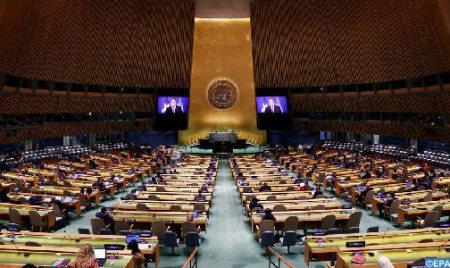Moroccan Sahara: Autonomy Initiative Provides ‘Favorable Environment’ for Social, Economic Development – Malian expert –
The autonomy initiative proposed by Morocco to settle the Moroccan Sahara issue provides a “favorable environment” for the social, economic and cultural development of the region, said, in New York, Youssef Coulibaly, expert in the law of armed conflict, peace and security in Africa and the Sahel. Speaking on Thursday before the 4th Committee of the UN General Assembly, Mr. Coulibaly, who is also a professor of public international law at the University of Legal and Political Sciences of Bamako, stressed that the Moroccan initiative will enable to settle definitively this politico-security crisis in the region. He noted, in this regard, that the United Nations must adopt the solution proposed by the Kingdom of Morocco. Referring to the security threats in the region, the Malian expert observed that for half a century “we passively witness in the spaces under the control of the Polisario, the development of vast trafficking networks of all kinds to the point that this area has become a hub or even a sanctuary for international organized crime”. “Main source of insecurity in the Sahel, transnational crime has taken up residence in the Sahara, thus constituting a brake for social and economic development”, he pointed out, adding that this situation has a negative impact on political stability and economic development, social and cultural aspects of the countries of the sub-region. For his part, Mr. Mehdi Maalainine Boulon, a young Moroccan from the Sahara region, said that the southern provinces are experiencing an unprecedented dynamic of investment and development. This is the region with one of the highest growth rates in the Kingdom, said Mr. Boulon before the Committee, noting that thanks to major infrastructure projects and an “unwavering commitment” to social justice, this part of the national territory has one of the lowest poverty rates in Morocco. He also observed that the Sahrawi populations, who manage their own affairs, participated massively and freely in the triple election of September 8, unlike the populations who are held against their will in Tindouf camps, in the southwest of Algeria. “It is inconceivable that a separatist group, installed in another country, claims to speak on behalf of the populations of the Sahara, who are proud of their Moroccan identity”, noted Mr. Boulon, adding that this group “is simply a minority which imposes to the people held in Tindouf camps a degrading life”. The populations of the southern provinces have chosen life with dignity and prosperity over that of humiliation and poverty, he said, insisting, at the same time, on the urgency of finding a solution to this regional conflict over the Moroccan Sahara on the basis of the autonomy initiative.

